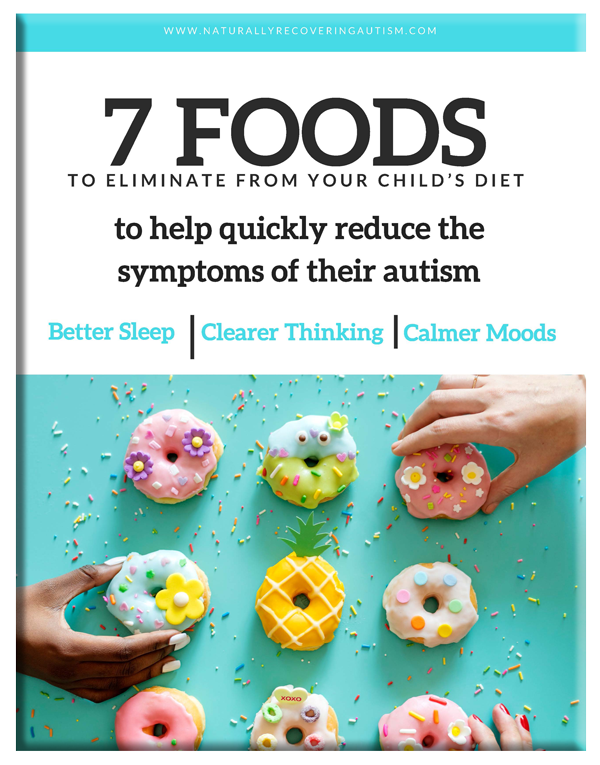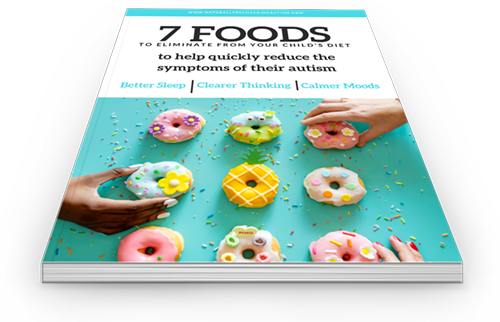What is Excitotoxicity?
Excitotoxins are toxins that will excite the neurons in your brain. They can also be referred to as neurotoxins because they damage and destroy the brain and spinal cord. What most people do not realize is that these toxins are in the foods they commonly eaten every day. The problem with these toxins is that they will excite brain cells to death. They literally die. This causes the brain to secrete glutamate and aspartate (excitotoxins), which cause negative behavioral changes. This can cause faulty wiring of the brain, especially during its developmental stage.
Children on the autism spectrum and with ADHD are particularly sensitive to these chemicals because their detoxification systems are not as capable as others to handle them. It is also vital to protect their brains from any further harm.
Those who are particularly sensitive and should not consume these products are children, babies, and pregnant women, and also those with depression, migraine headaches, heart issues, any nervous system disorder, kidney problems, or vascular disease. Remember that all of us are susceptible to harm by these toxins, not just those with an existing neurological condition or a compromised immune system. The elderly are also quite susceptible to these dangers.
What is Glutamate?
Glutamate is an amino acid and a neurotransmitter for the brain. It helps stimulate brain cells, which help neurons to communicate. It all sounds good until it is too much of a good thing. When these neurons get over-excited, it can cause seizures and even kill brain cells.
The brain has a normal control system that regulates the amount of glutamate released in the brain. Protein carrier molecules bind with the glutamate in the brain and help keep it safely stored until it is needed. This system is delicate and susceptible to breaking down. Even microscopic amounts of glutamate can trigger excitotoxicity or death of brain cells. In large quantities, glutamate increases the production of free radicals, causing greater injury to the brain, blood vessels, and the blood-brain barrier. It can also cause oxygen deficiency in the brain.
When other forces, such as foods with added excitotoxins, or hypoglycemia (low blood sugar) come into play, the glutamate system can become overwhelmed. Infants and children are extremely susceptible to this system becoming impaired because their brain is still developing and their protective blood-brain barrier is not yet intact. Glutamate can easily pass through the placenta and enter the bloodstream of the fetus during pregnancy.
Mercury is a heavy metal known to inhibit the protective protein carrier molecules, therefore, causing excitotoxicity. Mercury interferes with this system as long as it is in the brain, and this destructive process can go on for many years. Glutamate is intricately involved in the formation of brain circuitry so the accumulation of glutamate causes mis-wiring of the brain.
The results of mis-wiring can be subtle and include poor cognitive abilities, memory trouble, or an inability to control anger. Sensory- processing disorders increase when glutamate activates certain genes. These genes affect the nervous system’s ability to adapt to changes in stimuli. Learning, absorbing, and analyzing information can become difficult or impossible. The effects on the brain vary per individual based on biology. In more extreme cases, the child ends up with autism.
Excitotoxins can be found in ingredients of monosodium glutamate (MSG), aspartate or aspartame (artificial sweeteners such as Nutrasweet), hydrolyzed vegetable protein (cysteine), and aspartic acid. Some common foods that increase glutamate levels in the body are tomatoes, fermented foods, and soy products, especially soy milk. Soy milk is hydrolyzed, therefore increasing the level of free glutamate.
Monosodium Glutamate (MSG)
Used as a flavor enhancer or artificial flavor, the most commonly used excitotoxin in our food is monosodium glutamate, also known as MSG. It is cheap to use and it will fool your brain into thinking that the food tastes better than it does. Food manufacturers and restaurants know and like this.
The USDA has defined MSG as “naturally occurring,” so it is allowed in our food and is regarded by them as safe. Do not be fooled by this. MSG is known to cause behavioral problems, and worse yet, MSG excites neurotransmitters (the brain’s messengers). As I mentioned before, these nerve cells become so excited that they are excited to death, and the effects begin in as little as 15 minutes after ingestion.
MSG also negatively affects neurotransmitter levels.There can be up to an 80% drop in acetylcholine, which is involved in learning and memory. It is also known to greatly reduce norepinephrine, which is involved in attention and focus.
Children are four times more susceptible to the dangers of MSG and aspartame than adults are (Neurotoxicology 2 (1980), Olney, Excitatory Neurotoxins as Food Additives.) There is a fine- tuned pruning process that occurs in the brain during development. Glutamate and aspartate affect this process and can cause faulty wiring of the brain and its functioning. Low blood sugar, or hypoglycemia, can trigger glutamate levels to rise and cause negative behavioral changes. Aggressive behavior, loss of emotional control, and hyperactivity are common symptoms. Glutamate can also trigger seizures. One study done using glutamate and aspartate on mice showed extreme damage to the cells of the retina, affecting vision. The younger the animal, the worse the damage is.
We have mentioned that the part of the brain called the hypothalamus has no blood-brain barrier. It also has the highest number of glutamate receptors. This is especially important during puberty because the hypothalamus controls the endocrine system throughout the body. Through this system, the brain regulates growth, metabolism, and the onset of puberty. Damage from MSG to this part of the brain in a newborn causes an extreme deficiency of the immune system that can last their entire lifetime. Glutamate will bind with aluminum and increase its absorption in both the bloodstream and the brain.
The hypothalamus uses glutamate as a neurotransmitter. Excess glutamate causes excitotoxicity destroying brain cells. MSG can also affect the adrenal glands. The hypothalamus is involved in emotion, learning, and memory.
Biological changes from glutamate levels may include problems with the endocrine system, leading to reproductive problems, hypothyroidism, and weak adrenal glands.
Damage to the hypothalamus via excitotoxins can lead to:
The lack of growth hormone excreted by the hypothalamus causing stunted growth
Early onset puberty
Reproductive problems
Trouble producing breast milk following birth
Thyroid trouble
Weak adrenal glands
Obesity: MSG contributes to metabolic syndrome. This occurs when the metabolism and insulin levels become imbalanced. This can lead to type II diabetes, especially in young people. It is one more reason why MSG contributes to obesity.
Anger
Cognitive problems
Poor memory
Autism
Food Labeling for MSG
Due to the growth of public knowledge regarding the dangers of MSG food manufacturers have become quite clever when it comes to ingredient labels. The ingredient is often masked under a different name.
The following may contain enough MSG to serve as common reaction triggers. Take this list with you to the grocery store.
Some of the hidden sources of MSG on ingredient labels to look for:
Anything ending in “ate” is bad, such as glutamate
Yeast foods and extracts
Autolyzed ingredients, such as autolyzed yeast extract
Hydrolyzed ingredients
Calcium caseinate
Sodium caseinate
Textured proteins, such as textured vegetable protein (TVP)
Gelatin
Maltodextrin
Glutamic acid-note that glutamine should be included due to its chemical change in the body converting it to glutamate. Glutamine is a good source to help heal the gut lining but it should be used short-term in supplemental form only-maybe just a month or so. (Note: The candida and other pathogens and toxins should have been worked with already to at least reduce the toxic load before giving glutamine.)
Removing mercury and aluminum
My greatest concern with glutamate toxicity is if a person has aluminum and mercury toxicity, which is very common, and most likely when someone has autism.
Two products that can be helpful in removing the toxic load of mercury and aluminum:
Oxy E Plus Silica is excellent for aluminum removal.
Pure Body ‘extra’ zeolite for heavier metal removal such as mercury.
Please also listen to related podcasts:
Mercury Toxicity [Podcast Episode 104]
Toxic Heavy Metals Linked To Severe Autistic Behaviors
*What Causes the Symptoms of Autism? [Podcast episode #134]
♥
Quickly Reduce Your Child’s Symptoms
of Autism by Eliminating 7 Specific Foods that Most People Consume Daily!
The first crucial step of autism recovery is to begin restoring health to the gut and the immune system.
The health of the gut is directly linked to the health of the brain and therefore to the symptoms of autism. In fact, 80% of the immune system comes from the gut so if the gut is not healthy, then the brain can’t thrive, and the immune system is compromised. It’s a vicious cycle, but thankfully, it’s one that we can put an end to by first eliminating harmful foods.
This is for informational purposes only and is not meant to diagnose or treat. Every child’s level of recovery is different. No two people are the same. It is never implied that all children will have the same outcome. Results are all based on individual biology and the work that is done. This process takes time and various steps, effort and resources need to be weighed. Our programs are intended to help you become more knowledgeable and guide you to help bring your child a better quality of life, whatever that may be. We want to help by giving great content, direction and strategies that move you forward. Nothing on this page or any of our websites is a promise or guarantee of results or future outcomes. The results on this page and any of our websites are not typical or promised. In fact, there will be people who purchase this and other programs and never put the work into implementing the strategies taught and therefore will achieve little to no results. Our more detailed earnings disclaimer, privacy policy, and terms and conditions for this program and website can be accessed via the links below. We hold ourselves (and you) to a high standard of integrity. We are cheering you on every step of the way.











